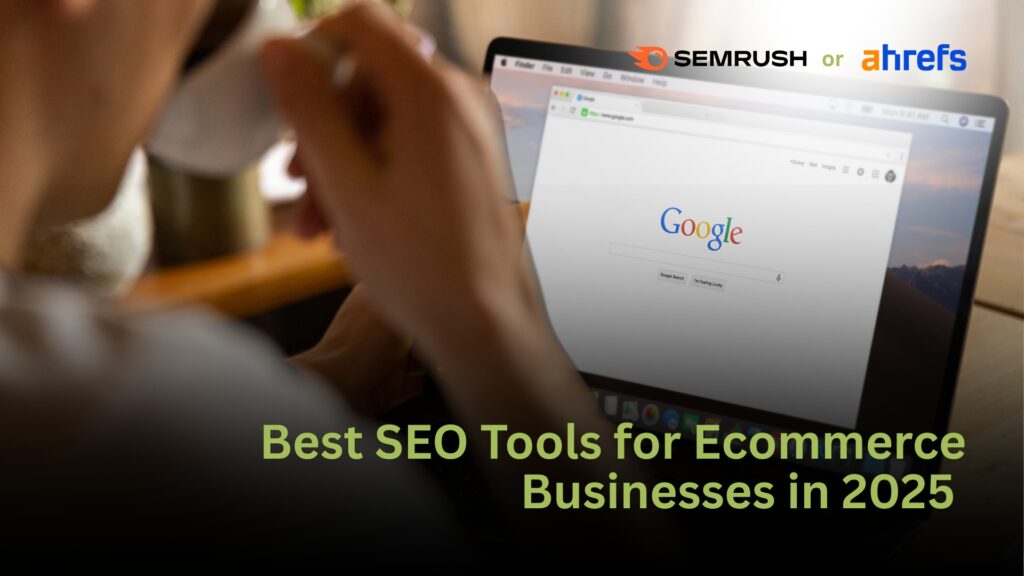If you run an ecommerce business, SEO is one of the best ways to bring in consistent, long-term traffic. Ads can give you a quick boost, but ranking on Google for the right keywords builds trust, brings repeat buyers, and lowers customer acquisition costs. The key is having the right tools that save time, reveal data, and help you make smarter decisions.
Here’s a breakdown of the best SEO tools in 2025 for ecommerce stores, and how you can use them to grow your business.
Semrush
Why it’s great: Semrush is one of the most complete SEO platforms. You can use it for keyword research, competitor analysis, backlinks, and content planning. Ecommerce brands love it because you can track competitor stores, see where their traffic comes from, and uncover keyword opportunities before they get saturated.
Best for: Store owners who want a single dashboard for keyword research, backlinks, and ongoing tracking.

Starting from $10.83/month (yearly)
14 day pro exclusive access
Key Features
Extensive SEO toolkit with analytics and reporting
Keyword research, site audit, and competitor analysis tools
Content marketing and social media management features
Why We Recommend It
Provides a comprehensive set of tools for digital marketing
It helps improve website visibility and search engine ranking
Supports a wide range of marketing activities beyond SEO
Pros & Cons
- Very detailed and comprehensive data
- Regular updates with new features and improved capabilities
- Integrates with other digital marketing tools and platforms
- It can be overwhelming for beginners
- High subscription cost for advanced features
Ahrefs
Why it’s great: Ahrefs shines when it comes to backlinks and competitor research. It has one of the largest link databases, making it ideal for spotting where your competitors are getting authority. It’s also powerful for finding high-intent keywords and analyzing top-performing content in your niche.
Best for: Ecommerce sellers who want to build a strong link profile and dominate competitive niches.
Google Search Console
Why it’s great: Free and straight from Google, this is non-negotiable. It helps you track indexing, keyword rankings, and Core Web Vitals. For ecommerce stores, it shows which product pages are getting impressions and clicks, so you can optimize what’s already ranking.
Best for: Every single ecommerce business.
Rank Math (WooCommerce)
Why it’s great: For WooCommerce users, Rank Math is the go-to SEO plugin. It adds product schema, handles sitemaps, improves metadata, and even integrates directly with Google Search Console.
Best for: WooCommerce store owners who want a simple but powerful SEO plugin.
Shopify SEO Apps
Shopify users can choose from apps like Smart SEO or JSON-LD for SEO. These apps handle structured data, fix common SEO issues, and help your products appear with rich snippets on Google.
Best for: Shopify sellers who want quick, code-free SEO optimization.

Starting from $17/month
Get your free trial and $1 for the first month + Free store builder
Key Features
AI-powered product recommendations and marketing
Advanced fulfillment and inventory management
Seamless omnichannel selling
Why We Recommend It
Storage and Bandwidth:
Unlimited storage allows you to upload as many products and images as needed
Unlimited bandwidth means your site can handle many visitors and lots of activity without slowing down
Extras and Inclusions:
Secure, integrated payment gateway, with transaction fees waived if you use Shopify Payments
Access to an extensive app store to add features and functionality
Built-in tools for SEO, marketing, and analytics
Pros & Cons
- Comprehensive store management tools
- Wide range of themes and apps
- Excellent 24/7 customer support
- It can get expensive with additional apps and transaction fees
- Limited SEO capabilities compared to other platforms
Page Speed and Core Web Vitals Tools
Google puts huge weight on page speed and user experience. Tools like PageSpeed Insights and Cloudflare can help improve load times, which is critical for ecommerce. Faster sites reduce bounce rates and improve conversions.
Best for: Any ecommerce store serious about conversions and rankings.
Google Analytics 4 (GA4)
Why it’s great: GA4 tracks ecommerce-specific events like add-to-cart, checkout, and purchases. This lets you measure how your SEO and content efforts impact real sales.
Best for: Tracking ROI from SEO and knowing which pages bring revenue.
How to Stack These Tools
Shopify Stack
- Semrush or Ahrefs for research
- PageSpeed Insights + Cloudflare for speed
- ShortPixel for images
- GA4 for analytics
WooCommerce Stack
- Semrush or Ahrefs for research
- Rank Math for on-page optimization
- GA4 for analytics
Action Plan for 2025
Week 1: Run a full crawl with Screaming Frog and Set up Google Search Console + GA4.
Week 2: Research and map keywords with Semrush or Ahrefs.
Week 3: Implement structured data and compress images.
Week 4: Publish optimized product and category pages, then track improvements in rankings and revenue.
Final Take
SEO in 2025 is all about data-driven decisions and speed. With the right tools, you can uncover what customers want, optimize your store for rankings, and keep your site fast and user-friendly. Start with one research suite, a crawler, a speed tool, and analytics. That’s enough to see meaningful growth in your ecommerce business this year.

